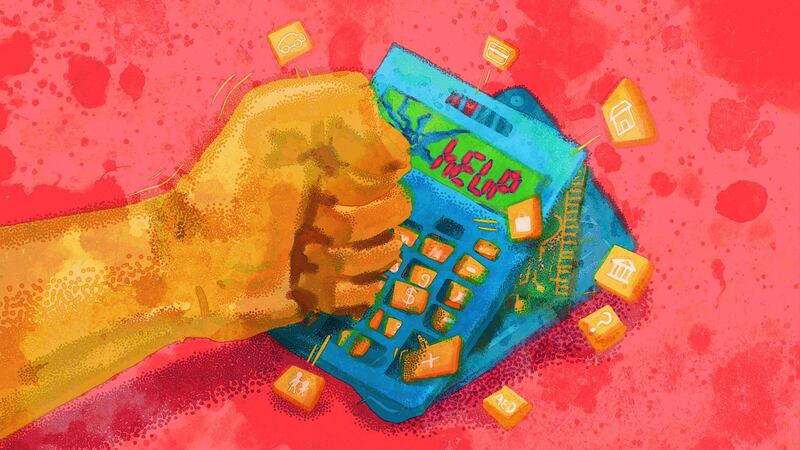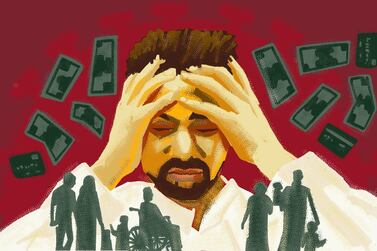I am having financial difficulties and need some help to solve my problem. I currently earn Dh6,200 a month but my financial responsibilities exceed my salary. These are my monthly expenses:
- Loan repayment: Dh2,700
- Room rent: Dh1,600
- Groceries: Dh1,500 (including baby products such as nappies)
- Credit card: Dh150 (minimum payment)
- Petrol: Dh800-Dh900
Every month, I end up having to borrow money as I don’t have enough to fulfil the basic needs of my family.
The principal amount of my loan is Dh99,600 but with interest, the outstanding balance is Dh103,226 and there is another three years left on the loan.
I am worried about losing my job and defaulting on the loan. If that happens, what will be the consequences? Is there anything that the bank can do to help me lower the monthly payments on the loan? I don't want to borrow money from people just to survive each month. RA, Dubai
Debt panellist 1: Philip King, head of retail banking at Abu Dhabi Islamic Bank
Your situation may seem overwhelming, but it is essential to remain optimistic and make all possible efforts to improve your financial circumstances.
Typically, when you miss repayments, banks charge late payment fees. This, along with the accrued principal and interest payments, will ultimately make your journey out of debt more challenging.
In addition, missed repayments can have a serious impact on your Al Etihad Credit Bureau score and affect your eligibility to avail future loans, or impact the rates you pay.
Generally, after three consecutive missed repayments and repeated warnings from the bank, they may file a police case or civil case against you, which can have some undesirable consequences.
To get your finances back on track, I advise that you speak to your bank to consolidate or refinance your debts into a single loan with lower rates and a longer tenure. They may also be able to provide facilities such as instalment deferrals to allow you to take a short-term relief from repayments.
It would be helpful for you to seek alternative avenues to improve your income and liquidity to supplement your debt management plan. This may mean finding a secure job with a better salary, and selling some of your assets (for example, your car) to raise additional funds to support your current cash flow.
It is also important to establish sound fiscal measures to help put you on a more sustainable financial footing. Make every effort to curb your expenses, such as moving to a cheaper accommodation, carpool to save on petrol costs, or perhaps consider relocating your family back home.
Debt panellist 2: Nathan McFarlane, founder of Helpwith.ae
It is a common occurrence for many people in the UAE to experience these kinds of difficulties, particularly with rising costs and a lack of understanding for the difficulties they may face when not being able to maintain debt payments.
I speak from experience in this situation: keeping up with payments while having little income for whatever reason can be extremely difficult, especially if you don’t understand the costs associated with maintaining timely payments and how to fix your financial problems.
The great news is there are solutions for your issue and you shouldn’t be fearful of what may or may not happen. The important thing is to look towards solving the problem, whether that be reducing your expenditure or finding a way to either restructure or settle your liabilities with the bank.
To reduce your monthly expenditure, you can look at restructuring your existing debt into a longer tenure (normally 48 months) if your credit score is still relatively good. This can be done with your existing bank if they grant it or you can search for other providers to buyout your existing liabilities.
I suggest a good starting point would be to download your Al Etihad Credit Bureau report, find out where your credit status is now and work towards a solution from there.
It is important to understand that these problems aren’t solved overnight – it’s a long-haul commitment to solve your financial problems. However, in the case of restructuring your debts, you may have to improve your credit score before being granted a loan from the bank.
Debt panellist 3: Felicity Glover, personal finance editor at The National
Worrying about debt and job security is a problem many people face at some stage in their lives. The Covid-19 pandemic has compounded this issue and created economic uncertainty for millions of people around the world.
It doesn't help that your salary is not enough to meet your financial responsibilities every month and you are going further into debt by borrowing money to support your family.
Depending on your skills and experience, there are a number of ways you can supplement your income to help you through this period, such as taking on freelance work through websites including Fiverr and Upwork.
Hiring is also expected to pick up in the UAE this year, so there is the option of looking for a new job that offers a higher salary. Is it possible for your spouse to also look for part-time work to help with the bills?
Any extra money you earn can also be used to pay down your loan faster.
In the meantime, try to find ways to cut down on your monthly expenditure to save as much as possible. This could include moving to cheaper accommodation and cutting down on transport expenses by catching public transport. It would also help to develop a budget and stick to it as much as possible.
It is also worth checking with your bank if it is possible to request a payment holiday on your loan or if you can restructure it over a longer period of time to lower your monthly instalments.
A last resort would be to sell assets if you have them. This could be anything from investments to a car, land or property. While assets are a financial safety net, sometimes it is the only choice you may have to get back on track and start saving for your future, which includes an emergency fund equivalent to three to six months of your salary that would help you in situations such as this.
Finally, there are consequences for missing debt repayments. Not only will this add interest and late fee penalites to the existing debt, but the bank can also file a police case against you after three missed payments.
Worrying about something that hasn't happened – in this case, losing your job – will only detract from what you must focus on: reducing your outgoings and boosting your income. While it may be difficult at times, particularly with a young family, try to use this energy to help you stay motivated and secure your financial future.
The Debt Panel is a weekly column to help readers tackle their debts more effectively. If you have a question for the panel, write to pf@thenational.ae









